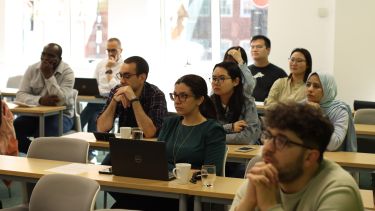Training and Development Opportunities

PhD students receive guidance and support throughout their research from a team of at least two academic staff supervisors. All supervisors are selected for their expertise and involvement in the appropriate field of study. The relationship with your supervisors will form the most important aspect of your work. There will be regular meetings to discuss ideas and progress, and a close working relationship will develop. The school also has a PhD tutor who will act as your advisor on general non-research matters.
Year 1
During the first year of your PhD, you will receive advanced training in econometrics, research methods and other relevant topics as part of the ECN610 Doctoral Training in Economics module. You will also be required to participate in the Faculty's Doctoral Development Programme. For those whose first language is not English, courses in English geared towards research needs are also available.
At the end of your first year, you will undergo a confirmation review to evaluate whether your project has the potential for successful completion at doctoral level. This involves submitting a draft of your first chapter and undergoing an oral examination; you will be assessed by a panel comprising of at least two academic members of staff who have not had any previous close association with your research project. Upon successful completion of the confirmation review, and passing the assessment for ECN610, your status as doctoral researcher is confirmed.
Years 2 and 3
During the second and third years, you will be working to complete your research. This usually comprises two more research papers. Over these two years, you will have the opportunity to develop your research skills and broaden your knowledge and experience beyond your particular research field.
Final semester
You will use the final semester for writing and finalising your dissertation. You are expected to submit your dissertation 3.5 years after starting the PhD programme.
Attendance at research seminars, trainings, and conferences both within and outside the school is encouraged. Funding is available to help you attend conferences and training in the UK and overseas.
Doctoral Training in Economics
Your doctoral training in the first year will include lectures, student workshops, individual review meetings and other discipline-specific research activities. The taught component in the first year of the PhD is structured in two main parts: Advanced Econometrics (divided into micro- and macro-econometrics) and Advanced Research Methods for Economists. These two modules will be assessed at the end of the first year with a final exam for the Advanced Econometrics module, and with a submission of the advanced research proposal for Advanced Research Methods. You will also be invited to audit additional modules at master level relevant to your research topic.
All PhD students are also expected to attend discipline-specific research events, such as research seminars, research group meetings, PhD-led reading groups and academic conferences.
The Doctoral Development Programme
The Doctoral Development Programme is a flexible training programme that teaches PhD students the skills they need to successfully complete their dissertation and achieve long-term career and personal development goals.
The programme is adapted to each student's needs, as determined by the annual Training Needs Analysis. Once your training needs are identified, supervisors will help you choose the right modules to study, from the wide range on offer across the University.
Training throughout the PhD programme will combine:
- Subject-specific training, such as methods in advanced econometrics.
- General research training, such as writing or literature review skills.
- Personal development training, such as developing communication or teamwork skills.
Students will also be involved in seminars and workshops organised by the school. This allows them to be exposed to new ideas and interact with researchers outside the school.
PhD Conference
Each year, PhD students present their ongoing work to their peers and other staff members in the annual PhD Conference. This gives an opportunity to clarify the ideas and receive feedback in a supportive environment. It also develops communication skills and facilitates collaboration between students.
Tutoring
PhD students can work as tutors in tutorials or problems classes in a wide range of undergraduate modules offered by the school. Tutoring provides valuable teaching experience and supplemental income.
